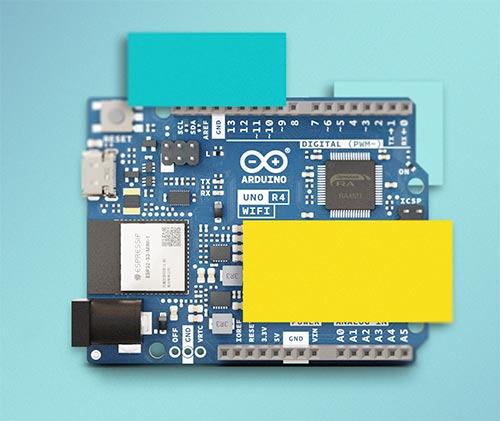 Arduino is excited to introduce the latest addition to its iconic UNO family: the UNO R4. With no plans to discontinue the popular UNO R3, the UNO R4 will come in two versions – UNO R4 WiFi and UNO R4 Minima – offering unprecedented performance and possibilities for the maker community.
Arduino is excited to introduce the latest addition to its iconic UNO family: the UNO R4. With no plans to discontinue the popular UNO R3, the UNO R4 will come in two versions – UNO R4 WiFi and UNO R4 Minima – offering unprecedented performance and possibilities for the maker community.
The UNO R4 is powered by the Renesas RA4M1 32-bit microcontroller based on the Arm® Cortex®-M4 core, providing a significant boost in processing power, memory, and functionality. The WiFi version comes with an Espressif S3 WiFi module, expanding creative opportunities for makers, educators, and hobbyists alike.
Designed for maximum compatibility, the UNO R4 maintains the same form factor, shield compatibility, and 5V operating voltage as its predecessor. Software compatibility is also a priority, with most existing libraries and examples working seamlessly on the new board.
The UNO R4 WiFi features Wi-Fi and Bluetooth Low Energy® connectivity, while the UNO R4 Minima provides a cost-effective option for those seeking the new microcontroller without additional features. Support for other Renesas microcontrollers, such as the RL78/G22 and G23, has also been added to the Arduino IDE.
Massimo Banzi, co-founder and chairman of Arduino, announced the UNO R4 during Arduino Day 2023, a global celebration of Arduino’s user community. He believes the UNO R4 is a new chapter in the UNO story and the perfect way to move forward, leveraging the latest available technology.
“We are honored to collaborate with Arduino on their iconic UNO product line. Despite the challenges of this intricate project with a rich legacy, our 5V 32-bit Arm® Cortex M4-based microcontrollers facilitated a smooth upgrade path, offering enhanced performance and resources to unlock endless potential for makers worldwide,” comments Chris Allexandre, SVP, CSMO and Head of Global Sales and Marketing at Renesas. “As both a technology company and an investor, we take immense pleasure in supporting Arduino’s mission to empower innovation by making advanced technology accessible and user-friendly for all.”
“We believe that even iconic products must evolve to keep up with the ever-changing needs of our community and technological advancements. While maintaining the UNO R3 in our product lineup, we collaborated closely with our partners Renesas and Espressif to create the most compatible and powerful maker board on the market,” says Fabio Violante, CEO at Arduino. “I’m eager to see the incredible projects the community will develop, particularly with the UNO R4 WiFi. Imagine the possibilities for STEM educators and makers by utilizing existing shields and accessories and leveraging WiFi to connect to the Arduino Cloud or other platforms.”
The Arduino UNO R4, featuring the Renesas RA4M1 (Arm Cortex®-M4) running at 48MHz, boasts a 3x performance increase over the UNO R3. Additionally, SRAM has been upgraded from 2kB to 32kB, and flash memory from 32kB to 256kB to support more complex projects. Responding to community feedback, the USB port is now USB-C, and the maximum power supply voltage has been raised to 24V with an enhanced thermal design. The board includes a CAN bus and an SPI port, enabling users to reduce wiring and perform parallel tasks by connecting multiple shields. A 12-bit analog DAC is also provided on the new board.
To ensure maximum backwards compatibility with existing code examples and tutorials, significant efforts are being made on the software side of the UNO R4. Popular Arduino libraries are being optimized, and in most cases, they will work out-of-the-box. However, some libraries that were previously optimized for the AVR architecture in R3 may require porting to the new Renesas architecture. To assist with the transition, Arduino will provide a public list of such libraries, along with links to alternative options. To encourage library developers to port their low-level code to the Renesas architecture, an early adopter program has been launched. Interested developers can visit the dedicated website at www.arduino.cc/UNOR4 to learn more.
The Arduino UNO R4 is set for release in late May, with more details about its features to come. You can register for updates here: https://store.arduino.cc/pages/unor4


